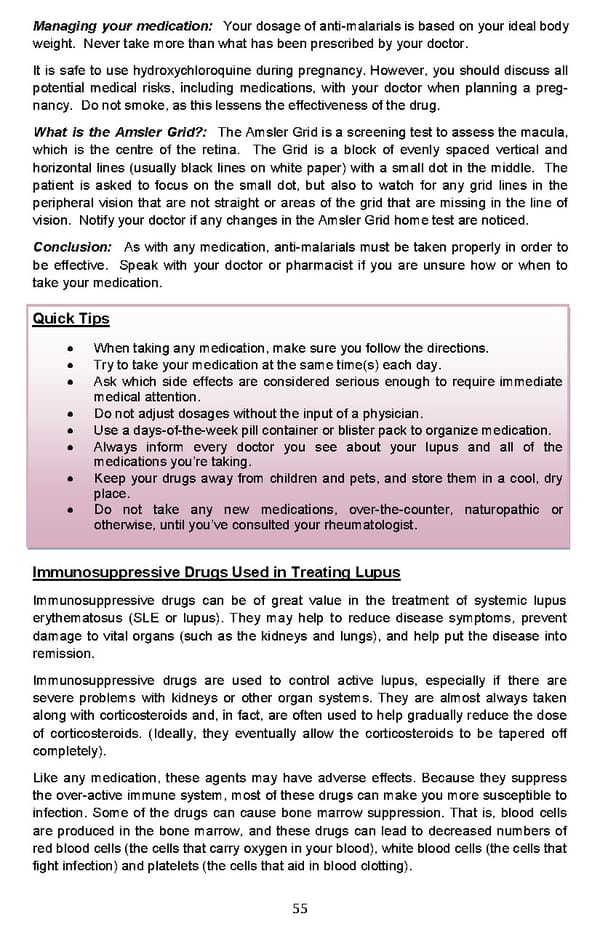Managing your medication: Your dosage of anti-malarials is based on your ideal body weight. Never take more than what has been prescribed by your doctor. It is safe to use hydroxychloroquine during pregnancy. However, you should discuss all potential medical risks, including medications, with your doctor when planning a preg- nancy. Do not smoke, as this lessens the effectiveness of the drug. What is the Amsler Grid?: The Amsler Grid is a screening test to assess the macula, which is the centre of the retina. The Grid is a block of evenly spaced vertical and horizontal lines (usually black lines on white paper) with a small dot in the middle. The patient is asked to focus on the small dot, but also to watch for any grid lines in the peripheral vision that are not straight or areas of the grid that are missing in the line of vision. Notify your doctor if any changes in the Amsler Grid home test are noticed. Conclusion: As with any medication, anti-malarials must be taken properly in order to be effective. Speak with your doctor or pharmacist if you are unsure how or when to take your medication. Quick Tips • When taking any medication, make sure you follow the directions. • Try to take your medication at the same time(s) each day. • Ask which side effects are considered serious enough to require immediate medical attention. • Do not adjust dosages without the input of a physician. • Use a days-of-the-week pill container or blister pack to organize medication. • Always inform every doctor you see about your lupus and all of the medications you’re taking. • Keep your drugs away from children and pets, and store them in a cool, dry place. • Do not take any new medications, over-the-counter, naturopathic or otherwise, until you’ve consulted your rheumatologist. Immunosuppressive Drugs Used in Treating Lupus Immunosuppressive drugs can be of great value in the treatment of systemic lupus erythematosus (SLE or lupus). They may help to reduce disease symptoms, prevent damage to vital organs (such as the kidneys and lungs), and help put the disease into remission. Immunosuppressive drugs are used to control active lupus, especially if there are severe problems with kidneys or other organ systems. They are almost always taken along with corticosteroids and, in fact, are often used to help gradually reduce the dose of corticosteroids. (Ideally, they eventually allow the corticosteroids to be tapered off completely). Like any medication, these agents may have adverse effects. Because they suppress the over-active immune system, most of these drugs can make you more susceptible to infection. Some of the drugs can cause bone marrow suppression. That is, blood cells are produced in the bone marrow, and these drugs can lead to decreased numbers of red blood cells (the cells that carry oxygen in your blood), white blood cells (the cells that fight infection) and platelets (the cells that aid in blood clotting). 55
 Living Well With Lupus Facts Booklet Page 54 Page 56
Living Well With Lupus Facts Booklet Page 54 Page 56